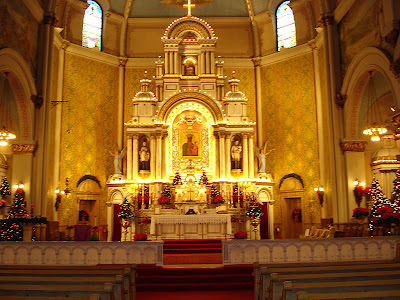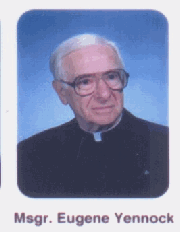Are The Masses You Attend Celebrated Worthily and Holily - Part II
In a previous post, we reviewed
the definition of a “worthily and holily celebrated Mass” that Father Reginald
Garrigou-Lagrange, O.P. offered in his book ThePriest In Union with Christ - a book I
again highly recommend.
This is, in part, what Father Reginald has to say about a
“hurriedly said Mass”:
A Mass offered in
haste is a scandal, in so far as the Kyrie, Gloria, Credo and Sanctus are
recited mechanically, without any spirit of faith…The prayers of the Missal are
read as though they were of no importance, whereas they are pregnant with such
meaning as will only be fully grasped in the light of the Beatific Vision.
As painful an exercise as the
following may be, it would be worthwhile to take a look at two other types of
Masses the good Friar describes – “the hurriedly said Mass” and the one that is
“outwardly correct but lacks the spirit of faith” - neither of which has resurrected
or can resurrect the sense of awe and amazement in the Holy Sacrifice of the
Mass and the Eucharist to which Catholics are entitled and that Blessed John
Paul II advocated and so longed for each of us to experience.
“This haste in
saying Mass shows that the priest has lost sight of the true importance and
seriousness of his life. For him it is no longer the Mass that matters most,
but outward activity and a pseudo-apostolate. With the disappearance of almost
every vestige of an interior life, there has disappeared also every hope of a
fruitful apostolate, since that is the heart and soul of any genuine apostolate…
The Mass becomes a
mere formula of words, rendering contemplation impossible. And yet, if there
are any words which ought to be recited with the utmost care and contemplative
insight, they are the words of the Missal – the Kyrie, the Gloria and the Credo.
But in the hasty Mass they are recited mechanically in order to finish Mass more
quickly. Genuflections are made with equal haste – empty gestures, devoid of
the spirit of worship…”
The wise friar then describes another deficiently celebrated
Mass, one that is “outwardly correct but lacks the spirit of faith”:
This Mass is one in
“which the priest pays careful heed to the external rite, to all the rubrics –
perhaps he himself is a keen rubrician - but he offers the Mass as though he
were nothing more than a mere ecclesiastical official, seemingly devoid of any
spirit of worship. He knows the rubrics and observes them, but he pays little
regard to the infinite worth of the Mass or to the principal Offerer whose
minister he is. Such a priest is another Christ in outward appearance only, in
so far as he possesses the priestly character enabling him to offer Mass
validly, but he displays no signs of the true spirit of a priest. It would
appear that since the day of his Ordination, Sanctifying Grace and the
sacramental grace of Orders have not increased to any appreciable extent, although
they were given as a treasure to yield rich dividends.
True the priest
who celebrates in this way will think he is saying his Mass extremely well by
reason of his scrupulous regard for the rubrics, but that is the limit of his
aspirations. The Kyrie, Gloria, Credo, Sanctus, the words of Consecration and
the Communion prayers are said without any spirit of belief.”
A short handed way to express these concerns is to reference
the heading of a column written by Archbishop Charles J. Chaput, O.F.M. Cap. entitled,
“How we pray shapes what we believe.” The Latin phrase, Lex
orandi, lex credendi, expresses the same concept.
Catholics will unlikely come to a
true appreciation and understanding of the Holy Sacrifice of the Mass if all
they ever see is a “hurriedly said Mass” or one that is “outwardly correct but
lacks the spirit of faith”.
The words of Father
Garrigou-Lagrange, O.P. are an invitation for all to recognize the Holy
Sacrifice of the Mass as the single greatest daily event happening on this
planet, and a reminder to all priests, as St. Pius X taught, that “The sanctity
of the Christian people depends in large measure on the holiness of their
priests.”
This great Dominican author and
teacher would have appreciated the words of Blessed John Paul II: “Liturgy is
never anyone’s private property, be it of the celebrant or the community in
which the mysteries are celebrated…No one is permitted to undervalue the
mystery entrusted to our hands; it is too great for anyone to feel free to
treat it lightly and with disregard for its sacredness and its universality (Ecclesia de Eucharistia, note 52).
He certainly would have been
heartened and encouraged by the expanding availability of the Extraordinary
Form of the Holy Sacrifice of the Mass and the recent revisions to the Roman
Missal, as should we and our priests.
Pray for our priests, particularly for any who may not treasure the Holy Sacrifice of the Mass as they ought.




Comments